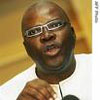 Tendai Biti, Zimbabwe’s well regarded finance minister and a loyal member of Prime Minister Morgan Tsvangirai’s Movement for Democratic Change, recently completed a fundraising tour of the United States and Europe aimed at making the case that international aid is necessary for Zimbabwe’s success. Politically astute Zimbabwean officials have put MDC officials — such as Biti and Tsvangirai — in the international spotlight, and Biti has become the de facto spokesman for the unity government. In meetings at the IMF, World Bank, and African Development Bank, as well as with American officials in the administration and on Capitol Hill, Biti underscored his commitment to maintaining rule of law in Zimbabwe and emphasized the new government’s successes. However, the responses he received from various hosts also highlight the opposing opinions regarding the merits of direct international support for Zimbabwe’s fragile unity government. Such tensions are compounded by contentions from the Government of National Unity, or GNU, that it is destined for failure without international support. As the Guardian highlights in a recent op-ed, donor states are scrambling to make decisions regarding a country for which there are many more questions than answers.
Tendai Biti, Zimbabwe’s well regarded finance minister and a loyal member of Prime Minister Morgan Tsvangirai’s Movement for Democratic Change, recently completed a fundraising tour of the United States and Europe aimed at making the case that international aid is necessary for Zimbabwe’s success. Politically astute Zimbabwean officials have put MDC officials — such as Biti and Tsvangirai — in the international spotlight, and Biti has become the de facto spokesman for the unity government. In meetings at the IMF, World Bank, and African Development Bank, as well as with American officials in the administration and on Capitol Hill, Biti underscored his commitment to maintaining rule of law in Zimbabwe and emphasized the new government’s successes. However, the responses he received from various hosts also highlight the opposing opinions regarding the merits of direct international support for Zimbabwe’s fragile unity government. Such tensions are compounded by contentions from the Government of National Unity, or GNU, that it is destined for failure without international support. As the Guardian highlights in a recent op-ed, donor states are scrambling to make decisions regarding a country for which there are many more questions than answers.
There are signs that some may be heeding Biti’s calls. Last week, he stopped off in London and took an official meeting with the British government. It was the first such meeting between British and Zimbabwean officials in almost a decade. Australia, too, has indicated a softening position towards the GNU. Biti also seemed confident that international monetary bodies will support his cause and that governments will increasingly funnel aid to Zimbabwe through a World Bank multi-donor trust fund, which should be up and running in a few weeks.
Instead of conceiving of Zimbabwe as a country actively in crisis, the GNU is asking the world to think of Zimbabwe as a post-conflict state and invest in it as such. Biti has likened the current situation in Zimbabwe to Lech Walesa’s Poland and Russia during Gorbachev’s implementation of glasnost and perestroika. However, Robert Mugabe has shown himself to be the opposite of a reformer during his decades in power, and despite the presence of MDC reformers in the GNU, the government — most notably ZANU-PF officials still sitting in positions of power — has continued many of the corrupt policies that led to Zimbabwe’s troubled state.
Countries such as the United States are now in a position in which inaction is just as much a policy decision as action. If they directly support the unity government, and the promised reforms do not occur, they have, in effect, supported corrupt, dictatorial officials who perpetrate mass violence to remain in power. However, if they do nothing, and the unity government completely unravels, those who could have possibly aided the country will be deemed at least partially at fault. Biti and the MDC promise that real reform is on the way. However, in the midst of infighting within the ZANU-PF and example after example of continued corruption, — most recently the re-arrest of more than a dozen pro-democracy activists– many experts argue that the compromise government in its current form, which the MDC contends was the only way to stop Zimbabwe from becoming the next Somalia, is neither the only way forward for Zimbabwe nor a path to lasting reform.
Photo of Tendai Biti courtesy of Voice of America.

